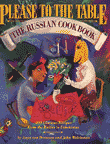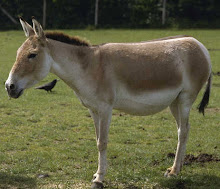 In June, I broke down and ordered In Search of Kazakhstan: The Land that Disappeared from Amazon.co.uk, hideous exchange rate, international shipping and all. I'd had my eye on it for months, and still no sign of a US edition in sight. It was worth the trouble. Christopher Robbins (author of Air America and The Empress of Ireland) has written a breezy, affectionate travelogue-style portrait of Kazakhstan, with history and character profiles interspersed among sights and adventures. And don't forget the apples.
In June, I broke down and ordered In Search of Kazakhstan: The Land that Disappeared from Amazon.co.uk, hideous exchange rate, international shipping and all. I'd had my eye on it for months, and still no sign of a US edition in sight. It was worth the trouble. Christopher Robbins (author of Air America and The Empress of Ireland) has written a breezy, affectionate travelogue-style portrait of Kazakhstan, with history and character profiles interspersed among sights and adventures. And don't forget the apples. The book opens with a portrait of the unnamed man who started Robbins on his quest. On a plane to Moscow, he sits next to a middle-aged American widower, en route to Almaty to meet his Internet fiancee. Naturally, the author knows nothing about Kazakhstan, and his seatmate proudly relates much of what he'd learned about the homeland of his bride-to-be. As they disembarked, the man "turned and made a throwaway remark that seemed insignificant at the time. The last words he addressed to me were, 'Apples are from Kazakhstan.'"
Robbins' travels cover the major areas -- southeast around Almaty, Astana (where he scores a personal interview with President Nursultan Nazerbayev), Karaganda, and the Aral Sea area; west to Atyrau & Baikonur, south to Taraz, and to Semey in the northeast. This is neither a hard-hitting expose, nor a backpacker's view of Kazakhstan. The meeting with Nazarbayev turned into several informal interviews over two years, and many of Robbins' excursions are the result of an invitation to join a presidential touring party. A coup for any writer, but no doubt it colored the author's perspective somewhat. Robbins isn't exactly an apologist for Nazarbayev -- he does acknowledge corruption and scandal in the upper echelons of government -- but he clearly emerges as a fan of the former steelworker who climbed to party boss, then President of a new nation.
Fascinating anecdotal history makes up much of the narrative. While Robbins tramps the southeast in search of wild apple orchards, we learn about the rise and fall of Russian geneticist Nikolai Vavilov, who identified the birthplace of more plants than anyone else in history. In Semey, we read of Fyodor Dostoyevsky's doomed love affair and of the Polygon's nuclear physicist Andrei Sakharov, who created the Soviets' hydrogen bomb. Trotsky lived in Almaty; in Karaganda, Alexander Solzhenitsyn. A long section relates the adventures of Captain Frederick Gustavus Burnaby of the British Army, who in 1875, on a whim, travelled from St. Petersburg across the steppe to Khiva and back again -- in the middle of winter.
This is all great reading, but begins to feel like a litany of things that have been done in and done to Kazakhstan, by outsiders. The real jewels in the book are the portraits of Kazakhstanis, none especially famous, but all fascinating in their lives and achievements:
- Krym Altynbekov in Almaty, the master restorer of almost all the archeological treasures found in Kazakhstan in the past 25 years, including the Golden Man and all the objects found with him;
- Gabit Sagatov in Kyzlorda, the remaining member of the "Kazakh Beatles";
- Boris Gudonov in Karaganda, Ukrainian by birth, who at age 8 was sent into the Gulag with his father, political scapegoat for a mining accident.
- Ykaterina Kuznetsova, a journalist, born in China to Russian parents, and raised in Karaganda, who has dedicated her life to documenting the Kazakh Gulag and the people who inhabited it;
- and the fruit that started it all, the legendary Aport apple, large as a baby's head, once famous throughout the Soviet Union for its scent and flavour, but now "uncool" (though no less delicious), and found only in markets around Almaty.
The book is illustrated with small sketches, including one of that wonderfully goofy ungulate, the saiga, in a discussion of Kazakh wolf overpopulation. Though there are no notes or even an index, it appears to be well researched.
Whether you're headed to KZ for business, adoption or adventure, living in Kazakhstan and wanting a positive, contemporary look at the country for overseas friends, family & colleagues, or an armchair traveller ready to explore, you'll enjoy the engaging writing, range of information, and a level of description and history lacking in the travel and political books. Christopher Robbins likes Kazakhstan. You'll like his book.
In Search of Kazakhstan: The Land That Disappeared. Profile Books, 2007. £12.99
Update: In Search of Kazakhstan was published in the US under the title Apples are from Kazakhstan. Atlas & Co, 2008. $24 (hardcover)


4 comments:
So, Mr.Robbins is a fan of a former steel-worker but did he talk to common people in Karaganda or Almaty?
I agree, that’s the biggest failing in Robbins’ book -- I think that by and large he only talked to people of relatively high status, college educated professionals or otherwise successful in some status-way. He didn’t talk politics with the berkutchi, for sure, or with any workers in Temirtau. I tried to say in the review (maybe not so well) that getting so much attention and patronage from Nazarbayev “hog-tied” him (to use an American country-ism) into skimming over the ugly parts of KZ presidential politics. It’s neither polite nor politic nor wise to disparage the giver of great gifts. Powerful people use this fact well.
The closest to a 'common' person profiled in the book is Boris Gudonov (is this a real name? It's also the title of a Russian opera), who was royally done over by Stalin, and also by the system afterwards. But blame is mostly put on the Soviet system, not on the current regime.
I find this blog most informative of life currently in former Soviet states...Some of you may be interested in my blog from Ireland which contains an article linking to a lot of Soviet Music..
I would like to invite your readers in Russia and elsewhere to view my blog ‘An Unrepentant Communist
http://unrepentantcommunist.blogspot.com/
Greetings to you all from County ’ Kerry in Ireland!
Nyura:
A DVD of Central Asian films is available from Soros Foundation's Open Society Institute:
http://www.eurasianet.org/
central.asian.dvd/announcement.shtml
Post a Comment